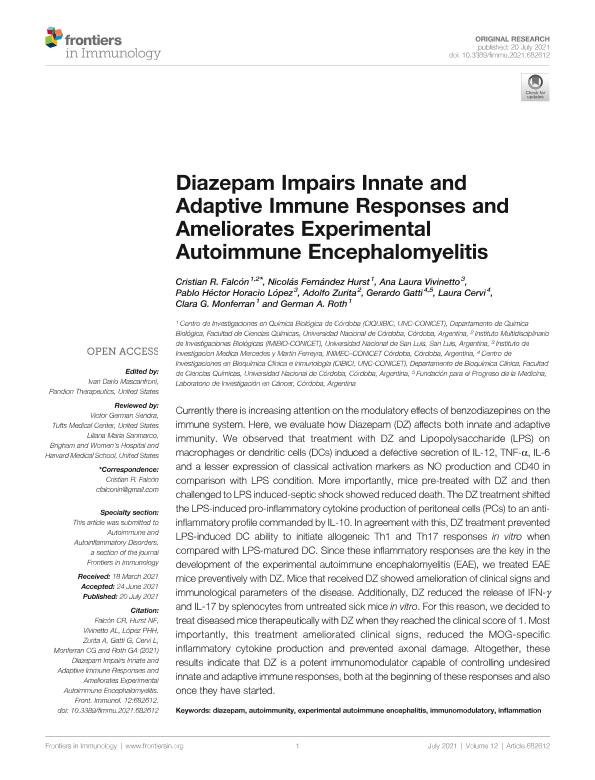Artículo
Diazepam Impairs Innate and Adaptive Immune Responses and Ameliorates Experimental Autoimmune Encephalomyelitis
Falcón, Cristian Roberto ; Fernández Hurst, Nicolás
; Fernández Hurst, Nicolás ; Vivinetto, Ana Laura
; Vivinetto, Ana Laura ; Lopez, Pablo
; Lopez, Pablo ; Zurita, Adolfo Ramón
; Zurita, Adolfo Ramón ; Gatti, Gerardo Alberto
; Gatti, Gerardo Alberto ; Cervi, Laura Alejandra
; Cervi, Laura Alejandra ; Monferran, Clara Graciela
; Monferran, Clara Graciela ; Roth, German Alfredo
; Roth, German Alfredo
 ; Fernández Hurst, Nicolás
; Fernández Hurst, Nicolás ; Vivinetto, Ana Laura
; Vivinetto, Ana Laura ; Lopez, Pablo
; Lopez, Pablo ; Zurita, Adolfo Ramón
; Zurita, Adolfo Ramón ; Gatti, Gerardo Alberto
; Gatti, Gerardo Alberto ; Cervi, Laura Alejandra
; Cervi, Laura Alejandra ; Monferran, Clara Graciela
; Monferran, Clara Graciela ; Roth, German Alfredo
; Roth, German Alfredo
Fecha de publicación:
07/2021
Editorial:
Frontiers Media
Revista:
Frontiers in Immunology
ISSN:
1664-3224
Idioma:
Inglés
Tipo de recurso:
Artículo publicado
Clasificación temática:
Resumen
Currently there is increasing attention on the modulatory effects of benzodiazepines on the immune system. Here, we evaluate how Diazepam (DZ) affects both innate and adaptive immunity. We observed that treatment with DZ and Lipopolysaccharide (LPS) on macrophages or dendritic cells (DCs) induced a defective secretion of IL-12, TNF-α, IL-6 and a lesser expression of classical activation markers as NO production and CD40 in comparison with LPS condition. More importantly, mice pre-treated with DZ and then challenged to LPS induced-septic shock showed reduced death. The DZ treatment shifted the LPS-induced pro-inflammatory cytokine production of peritoneal cells (PCs) to an anti-inflammatory profile commanded by IL-10. In agreement with this, DZ treatment prevented LPS-induced DC ability to initiate allogeneic Th1 and Th17 responses in vitro when compared with LPS-matured DC. Since these inflammatory responses are the key in the development of the experimental autoimmune encephalomyelitis (EAE), we treated EAE mice preventively with DZ. Mice that received DZ showed amelioration of clinical signs and immunological parameters of the disease. Additionally, DZ reduced the release of IFN-γ and IL-17 by splenocytes from untreated sick mice in vitro. For this reason, we decided to treat diseased mice therapeutically with DZ when they reached the clinical score of 1. Most importantly, this treatment ameliorated clinical signs, reduced the MOG-specific inflammatory cytokine production and prevented axonal damage. Altogether, these results indicate that DZ is a potent immunomodulator capable of controlling undesired innate and adaptive immune responses, both at the beginning of these responses and also once they have started.
Archivos asociados
Licencia
Identificadores
Colecciones
Articulos(CIBICI)
Articulos de CENTRO DE INV.EN BIOQUI.CLINICA E INMUNOLOGIA
Articulos de CENTRO DE INV.EN BIOQUI.CLINICA E INMUNOLOGIA
Articulos(CIQUIBIC)
Articulos de CENTRO DE INVEST.EN QCA.BIOL.DE CORDOBA (P)
Articulos de CENTRO DE INVEST.EN QCA.BIOL.DE CORDOBA (P)
Articulos(IMIBIO-SL)
Articulos de INST. MULTIDICIPLINARIO DE INV. BIO. DE SAN LUIS
Articulos de INST. MULTIDICIPLINARIO DE INV. BIO. DE SAN LUIS
Articulos(INIMEC - CONICET)
Articulos de INSTITUTO DE INV. MEDICAS MERCEDES Y MARTIN FERREYRA
Articulos de INSTITUTO DE INV. MEDICAS MERCEDES Y MARTIN FERREYRA
Citación
Falcón, Cristian Roberto; Fernández Hurst, Nicolás; Vivinetto, Ana Laura; Lopez, Pablo; Zurita, Adolfo Ramón; et al.; Diazepam Impairs Innate and Adaptive Immune Responses and Ameliorates Experimental Autoimmune Encephalomyelitis; Frontiers Media; Frontiers in Immunology; 12; 7-2021; 1-13
Compartir
Altmétricas



